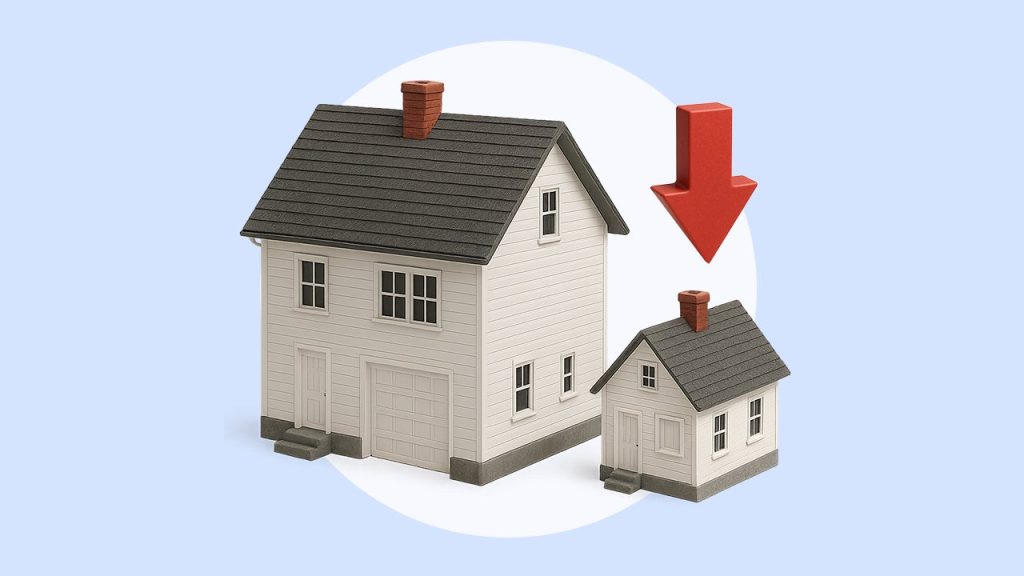When I bought my “dream” home, I thought I’d made it. A four-bedroom house in an established neighborhood that I fully paid off before I turned 35 — the American dream, right?
But a few years later, I did the unthinkable: I downsized well before the traditional retirement age. First to a two-bedroom townhouse, then to a one-bedroom apartment.
That decision became the key that unlocked my early retirement at 40, rather than 65 or later, like many Americans. I’ve discovered so many benefits from living a more intentional life in a smaller space — here are four reasons you should consider doing the same.
1. You might think downsizing is a step back — but it can actually create an energy leap
According to Bankrate’s 2025 Homeowner Regrets Survey, the most common regret is that home maintenance and other hidden costs were higher than expected, cited by 42 percent of homeowners.
When I gave up owning a big house, I also gave up hours of home maintenance, yard work and stress over repairs. And when something breaks, it’s the property manager’s headache, not mine. The cost of unexpected repairs and routine maintenance doesn’t come out of my pocket or my time.
Because my current home is significantly smaller, it also affords me the privilege of hiring a professional cleaner to come once a month, an expense I couldn’t justify when my square footage was much larger and the bill would have been two or three times higher.
But smaller living gave me more than just time savings — and without the time suck of chores I never enjoyed, I suddenly had the energy and creativity to focus on my goals. I streamlined operations, invested in new income streams and ultimately grew my business past seven figures this year.
2. You could be investing more money — instead of paying interest and property taxes
One of the most persuasive arguments against downsizing is that you may have to take on a higher mortgage rate or pay more for rent than you currently pay on a mortgage. But I encourage you to crunch the numbers with a mortgage calculator to determine whether the math works in your favor.
When I went back to renting, I intended to return to homeownership when the right opportunity came along. I didn’t expect that I’d still be happily renting three years later.
For most people, housing is the biggest line item in their budget — and one of the easiest to overlook. By strategically cutting that cost, I accelerated my net worth faster than if I’d put more cash into high-yield savings, my individual retirement account or my 401(k).
Keep in mind:
What I could be paying toward mortgage interest, property taxes and homeowners insurance now goes straight into my investment accounts. Not only is that money growing, but the passive income I’m earning from interest and dividends has been enough to cover my rent, essentially making me feel like I’m living rent-free!
3. You’ll find more value in where you live — not just the space you have
By choosing a smaller space, you may be able to afford to live closer to the city. I love living in the heart of my city, rather than out in the suburbs. I gained access to walkable neighborhoods, new restaurants, community events, music, theater and yoga, all within a few minutes of my apartment.
Many of my friends remember the grungy apartment complexes of our youth and wonder why I’d willingly return. But modern apartment buildings offer perks that weren’t common before 2020: onsite gyms, rooftop lounges and work-from-home-friendly amenities designed for post-pandemic life.
You don’t have to sacrifice comfort to downsize. In fact, you may feel that you have more square footage in the form of community entertainment space that isn’t your responsibility to maintain. My husband and I now have multiple lounges, a pickleball court, a pool, a grilling area and a co-working space to host friends and clients for less than our previous mortgage payment.
Bonus: I’m also saving several hundred dollars a year from my canceled streaming subscriptions. I’m having too much fun living in the real world to stay at home watching TV!
4. You can reach your money goals faster — without being house-poor
Selling your home to downsize doesn’t mean giving up on homeownership forever. But if you’re house-poor, or you’re spending too much on housing relative to your income, being a homeowner also doesn’t necessarily mean you’ll build wealth.
If the term “downsizing” makes you feel well, down, then think of it as rightsizing instead. It can mean using your resources now to build a life with more freedom, more options and less stress.
I’ve had five clients sell their larger homes this year for various reasons, but in each case, downsizing freed up more money to help them reach their financial goals faster. Thanks to the reduced living expenses, my clients have been able to:
- Pay off student loans that have been lingering for decades
- Build a proper cash flow cushion and emergency fund
- Free up capital to grow a business
- Max out their annual limits on retirement accounts for the first time in their lives
For you, it might mean paying off credit card debt more quickly, investing more consistently or redirecting your spending toward experiences that truly matter to you.
Money tip:
Try using a debt payoff calculator to see how much you can save in interest by freeing up cash to funnel toward debt. It may be the extra motivation you need to downsize sooner rather than later.
Final thoughts: You don’t have to wait for retirement to start living like you’re free
I didn’t downsize because I had to. I did it because I wanted to stop spending time and money maintaining a lifestyle that didn’t reflect the life I truly wanted.
And now, I live in a space that aligns with my values — and my budget — and I spend my time building businesses, investing and helping others do the same.
Could downsizing be your key to wealth building? Start by asking yourself whether your home is building your freedom or blocking it. And if you’re not ready to downsize just yet, you can start by re-evaluating your housing expenses with intentional budgeting and setting clear money goals to help you stay on track.
Why we ask for feedback
Your feedback helps us improve our content and services. It takes less than a minute to
complete.
Your responses are anonymous and will only be used for improving our website.
Help us improve our content
Read the full article here









